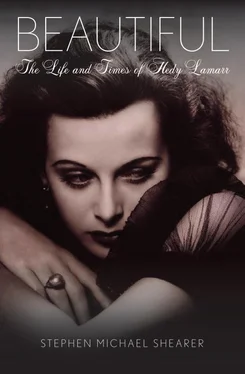Hedy left her Berlin role in Das schwächere Geschlect in early 1931, determined to work with Reinhardt in the new staging of the play in Vienna. Welcomed warmly back by her family, Hedy set out to the Theater in der Josefstadt where Reinhardt was preparing the production. “The Herr Professor hardly seemed to remember giving her permission to withdraw from the Berlin company,” wrote the future Pulitzer Prize–winning American journalist George Weller, who, as another young acting student in Reinhardt’s theatre company, was cast as “An American Man” in the Vienna production. “All [Reinhardt] said was, ‘Are you here, too, Fraulein Kiesler? Are you living with your family? All right, you can be the Americaness again.’” 2
Reinhardt loved his actors. And yet on at least one occasion with Hedy he was blunt. “He was a gentleman,” she told Eyman. However, “I remember one sentence. [My character] had been talking about my idea of luxury, to travel unimpeded but to wake up with the clothes and food and belongings of whatever country I happened to be in. And Reinhardt said, ‘Why don’t you try acting?’” 3
Before the Vienna premiere of Das schwächere Geschlect , Hedy returned to Sascha-Tobis-Film Studio and took a small role in Alexis Granowsky’s film Die Koffer des Herrn O.F. ( The Trunks of Mr. O.F .), which began shooting in the summer of 1931. Called “a fairy tale for adults,” the story was about thirteen trunks owned by a Mr. O. F. that were mysteriously delivered to a small-town hotel in the fictitious town of Ostend. The hotel’s proprietor (Ludwig Stössel), thinking Mr. O. F. must be a wealthy man, has his hostelry renovated, and the shops along main street follow suit. 4
The editor of the local newspaper (Peter Lorre) suggests that Mr. O. F. is a millionaire planning to invest in the small town. After weeks of no appearance of Mr. O. F., the hotel owner substitutes someone to pretend he is Mr. O. F., and then puts this man under a doctor’s care. Suddenly the town experiences a boom and becomes a city. After a year, the hotelier’s ruse is discovered, but everyone has forgotten the mysterious Mr. O. F. when an international economic conference is held in the thriving city of Ostend.
The star of the picture was Peter Lorre, celebrated at the time for his performance in the 1930 film M , wherein he portrayed a child murderer. For a needed change of pace, Lorre was cast in this light comedy set with music. Also in the picture was Harald Paulsen, who had appeared in Sturm im Wasserglas . Hedy was cast in the small role of the mayor’s daughter, opposite Paulsen. In an even smaller role was the twenty-six-year-old actor Aribert Mog, who would fall in love with the young Hedy during the filming.
Hedy performed in the picture during the day, and in the evening she would rehearse her stage role in Das schwächere Geschlecht. Filming concluded on Die Koffer des Herrn O.F . in October.
The plot of the comedy Das schwächere Geschlect, Reinhardt’s first play staged in Vienna, is actually quite similar to that of another then-popular play, Grand Hotel. It tells an overlong tale of a clever Argentine matriarch who has raised her two sons to prey on rich women vacationing on the Riviera.
“Within the play we were both playing at being Americans,” Weller recounted in a magazine piece. “Hedy had only the vaguest ideas of what the United States were, except that they were grouped around Hollywood.” The two young actors were each paid the humble amount of seven Austrian schillings a day. “We were supposed to be the stock figures of the tasteless, whooping North Americans, indispensable buffoons for the European stage which even then had little else that was safe to laugh at. We had several lines of sappy Snobismus .” 5
Reinhardt told the young Weller to teach Hedy some American songs. Immediately, Weller was criticized by Hedy for the way he danced. For her he danced much too fast. In Berlin she danced much slower with her partner, “a movie extra from Dusseldorf,” she proudly boasted. During rehearsals Hedy would softly whisper in Weller’s ear, “A little slower, please. We might dance right off the stage into the orchestra. The Herr Professor doesn’t expect us to be so much like American as that.” 6
Together Weller and Hedy studied American songs, Hedy writing down the English lyrics in notebooks. Like many Viennese of that day, Hedy loved the sentimental “Sonny Boy” made popular by Al Jolson in his 1928 film The Singing Fool , and she frequently took the opportunity to give her rendition. “In Act III there was a place where we Americans were supposed to break out in a ribald song, spoiling a tender Franco-Argentine marriage contract with our western animal spirits,” wrote Weller. 7“Every night, at this point in the drama, the Viennese public heard either ‘Yes Sir, That’s My Baby’ or ‘Yes, We Have No Bananas.’ At matinees it had to be ‘Sonny Boy’…. When we told all those Viennese women to ‘ nevah mind thuh gre-ey skies ,’ even the other actors stood in the wings and listened to us. All Vienna, the old Austrian Vienna, loved ‘Sonny Boy.’” 8
When Das schwächere Geschlecht opened in mid-November, 1931, it enjoyed a modest run. However, Reinhardt was already in Budapest preparing to open the play there. He then returned to Vienna at the end of the month and offered Hedy a larger, more substantial role in Noël Coward’s Private Lives, his next production.
A work Coward had written in just four days in Shanghai while he was recovering from the flu, Private Lives successfully premiered in London’s West End in 1930. Its two stars were its playwright Coward and the luminous Gertrude Lawrence. The plot revolves around just four characters, two couples: Amanda Prynne, on her second honeymoon with her new husband, the gullible Victor, and the insecure Sibyl Chase, on honeymoon with her new husband, Elyot.
As the story opens it is discovered that Amanda and Elyot were once married, and it is only after the two couples check in to the same French hotel do they realize their respective rooms are side by side. Amanda and Elyot soon understand that, though they cannot live together, they cannot live without each other.
Hedy was cast in the role of Sibyl. In the role of Amanda’s husband, Victor, was cast George Weller. Weller recalled an important moment that occurred during rehearsals of the play, a moment that would dramatically affect and define Hedy’s life and future career forever.
“It was at a rehearsal of a café scene,” in which the couple danced, Weller recalled:
There were Viennese newspapermen watching. Suddenly Herr Professor, a man not given to superlatives, turned to the reporters and succinctly pronounced these words: “Hedy Kiesler is the most beautiful girl in the world.” Instantly the reporters put it down. In five minutes the Herr Professor’s sentence, utter and absolute, had been telephoned to the newspapers of the Innere Stadt, to be dispatched by press services to other newspapers, other capitals, countries, continents. 9
By the time the play opened, in January 1932, theatergoers were anxious to get a look at this girl.
During the production of Private Lives , Hedy fell in love, albeit unrequited, with one of Reinhardt’s favorite students, who was not in the play. “I think that the first man who gave me a clean, happy feeling like that was one of Max Reinhardt’s actors, Wolfgang Albach-Retty,” Hedy would later write. “He was devilishly fascinating.” 10Her infatuation with the handsome actor perhaps enhanced her stage role.
The Viennese production of Noël Coward’s Private Lives enjoyed a dignified run. As it drew to a close, another play, Film und Liebe , went into production, again directed by Reinhardt. George Weller was cast as its leading man, a Hollywood director. But Hedy was not offered the lead female role, that of an actress. Instead, because of her ability to recite English by rote, she was offered a minor role—that of an American heiress. She declined the part.
Читать дальше
Конец ознакомительного отрывка
Купить книгу












